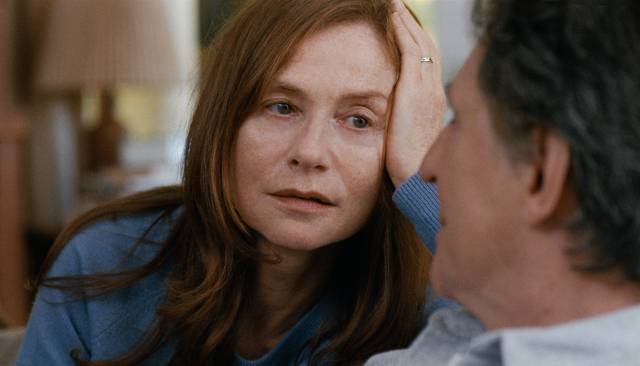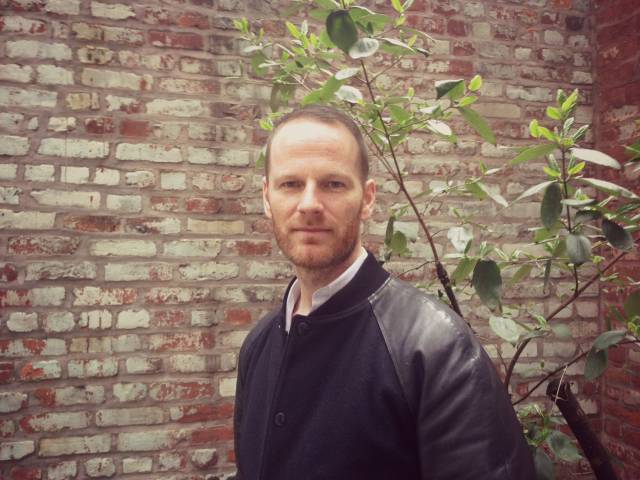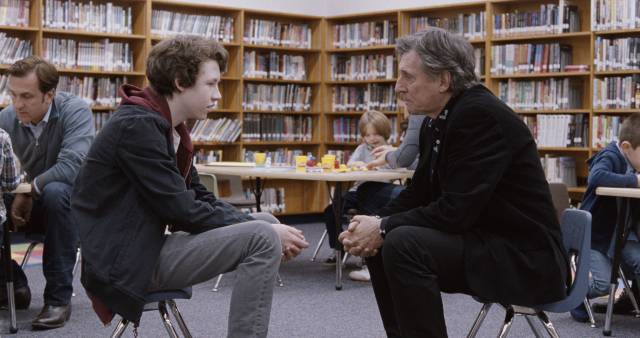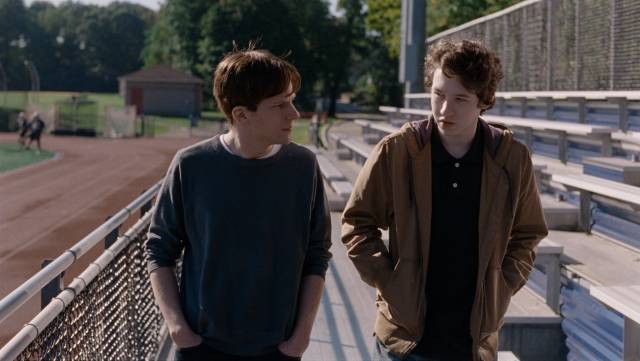
 There is an energy flowing through all of Joachim Trier’s films that make them feel truly alive, like breathing organisms you can affect just by proximity, and which by default can also have an effect on you. In Louder Than Bombs, his first English feature (after shooting Reprise and Oslo, August 31st in his native Norwegian) Trier presents us with the classic American family which has been portrayed in the films of Woody Allen and legendary playwrights like Arthur Miller, as we see three men cope with the death of Isabelle (Isabelle Huppert) a complex war photographer who left behind as many enigmas as she did precious memories.
There is an energy flowing through all of Joachim Trier’s films that make them feel truly alive, like breathing organisms you can affect just by proximity, and which by default can also have an effect on you. In Louder Than Bombs, his first English feature (after shooting Reprise and Oslo, August 31st in his native Norwegian) Trier presents us with the classic American family which has been portrayed in the films of Woody Allen and legendary playwrights like Arthur Miller, as we see three men cope with the death of Isabelle (Isabelle Huppert) a complex war photographer who left behind as many enigmas as she did precious memories.
Her husband Gene (Gabriel Byrne) is trying to reclaim his ability to feel romantic love again with one of his colleagues (Amy Ryan), and trying to connect to their youngest son Conrad (Devin Druid) who spends his time daydreaming about a classmate he has a crush on or immersed in video games. Isabelle’s eldest son Jonah (Jesse Eisenberg) is himself going through the stress of becoming a parent, while figuring out if he can be “better” or “different” than his parents. The performances are splendid, and it’s a joy to see actors you think you know, like Eisenberg and Ryan, bring an unexpected tenderness to their characters, most of which has to do with Trier’s great attention to detail and his sense of curiosity. He’s someone who makes films because he wants to learn more about the concept of being alive.
When we meet to discuss the film in New York City, he tells me a story about having just come back from seeing the former home of Paradise Garage, a legendary discotheque which now houses a phone company. Noticing his excitement, which increases when I share my love of disco music, and he sees my Keith Haring tattoos, I figure music is as good a place as any to start our conversation...
How did your love of disco and Paradise Garage come to happen?
I realized recently that growing up in Norway the first music I chose myself was the old school hip-hop: Afrika Bambaataa, Grandmaster Flash. Which then led to Grace Jones, Chaka Khan, and then I got into more stuff like Madonna, I was collecting 12” when I was 19 years old, my father used to be a jazz musician before he did sound for films. He was kind enough to take me to record stores in Oslo where I could get New York music. Later in my life I realized after being through all the spectrum of punk and house music, British invasion...everything, I realized that Paradise Garage and the post-disco movement had great political importance during the time when reactionary America went against gays, African Americans, women who wanted to have a life and didn’t want to get married, and wanted to have careers. There was a disco movement in New York that then turned this into different types of music, I DJ boogie and disco music that came before house. The Mecca where that developed was in places like Paradise Garage with Larry Levan. This is a side thing I do, primarily I’m a film guy but that whole era is important. Something about it connects me to my childhood, it connects me to New York even though I was a geeky kid halfway across the world in Norway.
One of the greatest things about New York is how these buildings change. Studio 54 which once was “a den of sin and drugs” is now a respectable Broadway house.
That’s funny. Whereas the hardcore Paradise Garage is now a phone company!
On that note, your dad was a sound guy and your grandpa was a film director. Making movies was inescapable then....
It seems that way! I had film in both parts of my family, my grandfather on my mother’s side was the director. Early on I was doing my thing with my skateboard and I ended up in the cinema seeds. I’ve always loved going to movies and have close friendships with people like my co-writer Eskil Vogt. We became friends in the 90s when we both went to the cinemas in Norway and watched old movies. Films were brought to my attention by my family, but I ended up rediscovering them myself.

Watching Louder Than Bombs made me think of two specific things: Cries and Whispers and Three Sisters. They are all about three female characters coping with the loss of someone important who keeps coming back to haunt them, but in Bombs you have three men remember a woman. I know you’ve been asked why Reprise and Oslo, August 31st were so male-centric, and I wondered if that had been in your mind at all in making Isabelle the central character?
She’s the pivot in a way.
Right, which is refreshing because it’s usually a dead dude looming large over women.
I like your perspective! I don’t consciously go into these things thinking in terms of gender. Ironically I’m currently writing a film about a young woman, so give me time and I’ll develop (laughs). I think you’re right though, in this one I was interested in separation and togetherness in the modern family. I know no one in my surroundings who at one point hasn’t had to deal with the inescapability of where you’re from, and how your family relations shape your future relationships. Grief and death are part of this film, but it’s also about men of three different generations interconnecting with new women in the aftermath of their absent mother. It’s funny, I never thought consciously of Cries and Whispers and Three Sisters, but you’re spot on. I obviously care a great deal about Bergman, but I also care about playwrights like Arthur Miller and Death of a Salesman, who was largely influenced by Ibsen. That’s more of a patriarchal story which was important to tell, but thank god now there is much more complex interplay between ambition, identity and both parents. I was interested in the vulnerability of the father, rather than the authoritative patriarchal figure.
The mom’s more of the “bad cop” in this one.
Or the admired. She’s the one who is admired, classically the 1950s cliché would be that mom did the food every day, but then when dad cooked one meal on Sunday night he’d be praised for it, which is terribly unfair. In this family the father stays put and she is the one who’s idealized.
This film is set in New York, the place of Woody Allen movies…
From which I draw on, I love Woody Allen.
…you show us cheerleaders, high schools and other elements that are very particular to American film. Were you overtly self conscious about the fact that you were writing a film set in NYC?
Yes and no, Eskil at one point said jokingly “Jesus man, all we know about American we learned from The Simpsons”, which is not quite true. I’ve spent a lot of time in New York and we both have friends here. We did some research, we needed to see if cheerleaders existed and yes they do. Jesse’s character at one point asks “they still do this shit?” And I’m ambivalent, because I think it’s beautiful, these women being thrown into the air is marvelous. I’m not trying to criticize but it seems the politics of high school are still complicated. These are also stages of life descriptions and I needed to nail them in this culture. Yes I wanted to do it, not so that it would fit into this American tradition, but with nuisance I hoped my perspective would contribute something. That’s up to others to decide though.
In Oslo Anders’ character is named Anders, in Bombs Isabelle’s character is named Isabelle. Was that because you wrote the characters for them and there was no point in giving them another name?
Almost. I liked that. It’s an invitation for the actors to bring something of themselves. I always check with them first to see if it’s OK, and it’s interesting because the films are companion pieces in a way. The first one deals with the great intimacy of a person going through great doubts of whether they want to live, and this one is about the aftermath of such a situation.
 I apologize in advance for the cheap psychoanalysis I’m about to exercise, but Isabelle’s character is a conflict photographer, and a filmmaker is basically someone who also photographs conflict. The film also shows so many elements about how images can be manipulated for an emotional effect. Was there any of you in this conflict photographer?
I apologize in advance for the cheap psychoanalysis I’m about to exercise, but Isabelle’s character is a conflict photographer, and a filmmaker is basically someone who also photographs conflict. The film also shows so many elements about how images can be manipulated for an emotional effect. Was there any of you in this conflict photographer?
I think the theme we’re dealing with is that on one level we want to be specific about what happens during the war to a conflict photographer. I read a lot, met a lot of them, and I highly respect the virtue of them witnessing something the rest of us don’t have to witness. It’s also a kind of addictive personality that does that kind of work, many of them talk about not being at ease back home, they need to go into conflict to feel. This isn’t necessarily virtuous, but it’s fascinating in how it affects them and the people around them. Even though this isn’t the story of a soldier, it’s about coming home. It’s about an America that’s been in international conflicts since 9/11, so this is a relevant story in that aspect too.
There’s also the question I ask myself as a filmmaker, and any conflict photographer asks themselves as well which is how to create human insight and not reduce people to clichés. How do you both manage the bigger theme of a story, but be particular about the human individual that you’re trying to portray. In this time and age, war photography of that sort which takes time and is contemplative, and is put into a context is not being prioritized as much as the immediacy. Here it is right now: explosion, death! Rather than here I followed a family trying to sustain life during war, which is what war is about trying to sustain your kids and have food. A lot of female war photographers like Alexandra Boulat and Carolyn Cole for example, and other great photographers have done more humanist work during these times. There’s a feeling there of melancholy that I maybe share as well because cinema is being challenged all the time. But I’m quite optimistic, I think people want deep stories, I’m drawn to them. There’s a wonderful book by Susan Sontag called Regarding the Pain of Others which anyone interested in this theme should read. It’s very inspiring.
In Reprise you touch on literature, in Louder than Bombs you deal with photography. Are you trying to define what other artform cinema best compares to?
It’s a good question and I don’t know if I’m trying to compare film, but I know I’m interested in how these different formats - including music, let’s not forget that - deal with form and content, or conveyance and cliché. There are these dichotomies they are always struggling with. Going back to Afrika Bambaataa, breaking things apart and putting them back together and being conscious of form. But a form that creates motion, not one that is necessarily intellectual or alienating, just a form that the way that you cut or use a voiceover actually creates the thing itself. That’s the feeling, that’s the now-ness of the film. I’m interested in how literature can do this differently than photography, I’m learning from these things, and yet it’s really to talk about existential questions of identity and representation in this case. In the same film we have a mother taking pictures of war and a kid playing video games online with war in them, and they mean completely different things and they’re happening in the same family. This is how vast the span of our reality and sense of representation has become. I’m just observing it, I don’t know if I can even say anything smart about it, it’s a really interesting dynamic.
In the film we see the father enter the son’s video game to try and learn about him, and then talk about how his son didn’t even recognize him, this is essentially a function that had been reserved for dreams. Do you think cinema is the best medium to capture dreams?
Dream, memory, to show it without explaining it that’s something cinema is great at. You don’t need to reduce it to meaning or define and yet it tells a lot. That is cinema to me. You can be very specific about a whole situation of sound and visuality and humanity without having to reduce it to a narrative point. To have moments of complete ambiguity, yet complete presence with a human character. To bring audience members to a point where they can reflect back on their own lives through the space you create between the image and them. In Louder I let people be allowed to identify with more than one character, I feel when I’ve talked to journalists many have spoken about how they identify with Conrad and falling in love for the first time, others talk about how they only have time for work like Isabelle, others about being afraid of becoming a parent like Jesse’s character. Any of those perspectives will hopefully work and give people a contemplative space in the theater space. That would be dream for this one, that people are allowed to think about themselves by watching the film.
Modern audiences have become used to having everything digested for them. If we see a leaf on the ground, the filmmakers will at some point show us how the leaf got there…
Cause and effect.
...however they respond better to that in commercials which I find very strange. They never would question the talking frog on TV, or how all these weird things happen in short amounts of time as they try to sell them something. You’ve done shorts and commercials, do you have any idea of why people are more receptive to surrealism and non-narrative structures in commercials?
I think you’re making a great point, when I made Reprise I said I wanted to kidnap back the montage from the music video and commercials, and start using it for deeper reasons in feature films again. Try to use them in more complex ways. I’m very interested in that. There is an ongoing debate about form, some people say that the transparency in cinema where you don’t feel the form is more authentic. If you do something where you feel the cut or the device, that takes you away from the film. So it’s either a) intellectual or b) superficial, so it’s bad in either case. You mustn’t be too smart, you mustn’t be too stupid (laughs), you have to stay in the middle: be transparent, be accessible, be easy. Sometimes people generalize, and I hope I don’t sound like a completely arrogant asshole, but people make statements that leave me puzzled, can it be this simple? Can you use all kinds of free form to express something interesting and human and truthful? That it’s not about the form, but about how you use it. So yes, you accept the talking frog in the commercial, but the talking frog can mean more in the right context rather than just sell you cell phone subscriptions. I agree with you, we should be open minded and cinema has always been a combination of high and low culture. On one level you have vulgar, seedy stuff and one level you have something highly sophisticated and almost sanctuous. That can be combined in the same movie, cinema is a great spectrum, it’s pop art! I want it to be dirty and free, I want it to be messy and alive, so that we as filmmakers aren’t abiding to the dramaturgical uh-ohs, of what works and doesn’t. Sometimes I even feel it in film criticism, some people talk about movies as if there is a rule set we must abide to. Damn it, we wouldn’t have Afrika Bambaataa if we thought that way!
 There’s a sense in your films that the lives of the characters keep going after we leave them. Do you know what happens to them next?
There’s a sense in your films that the lives of the characters keep going after we leave them. Do you know what happens to them next?
I do, I imagine them and think about them. I don’t wanna tell, but they live with me for a while and then I shake them out of my system to make a new film. Sometimes I even think of them as friends, it’s very moving. Reprise was shot ten years ago, time flies, and suddenly all these young men were reunited in Norway for a jubilee screening. I never watch my films again, but because everyone from the cast was there I decided to sit through the film again. Watching it after ten years was so moving, it was a snapshot of a moment in time. Cinema does a strange thing, in itself it’s about memory and the representation of time.
When I watched that movie it made me so anxious. I remember smoking half a pack of cigarettes and not being able to sleep afterwards.
Oh shit, see it again and maybe it’ll make you laugh at yourself as a young man.
Based on that, you said that you wanted to reclaim drama from HBO and it made me think how your films might leave some anxious because they don’t know what’s next after it’s done, and television has cliffhangers, but you have the security of knowing that in the next episode you will find out what was going on and find peace.
Maybe they have extreme anxiety because things move so fast. This is my theory of the day, it just happened now but you’re laying up to it. Maybe we have separation angst, we need things to continue and to be sustained because everything else changes so rapidly. So the idea of going back to a TV show is comforting. Some TV shows are great, The Wire changed my view of American society, it’s an insightful piece of art. Maybe a good film can force you to be with yourself afterwards and develop and use your imagination to think about it. I would love if people took something away that made them think of their own lives. Some people have said they saw Louder twice, we have a weird following and people have told me it was a good film to see twice. I was worried at the beginning that it was because the film didn’t work, but it turns out maybe that’s a compliment to the film.
Louder Than Bombs is now in theaters.